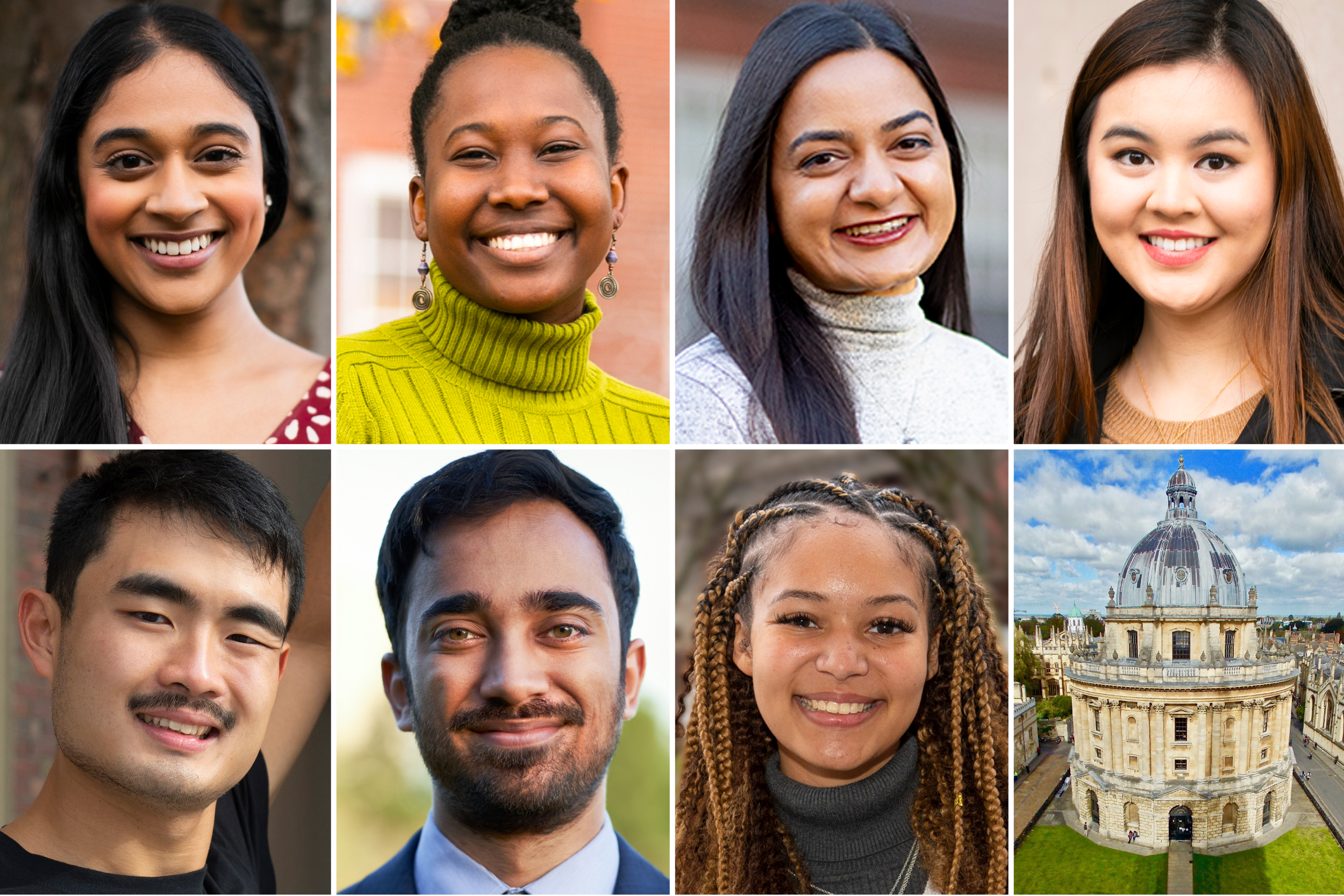
Harvard staff photos by Stephanie Mitchell, Rose Lincoln, and Jon Chase; contributed photo by Daniel Huang
A chance to focus on an academic passion at Oxford
7 Rhodes Scholars from Harvard represent sciences, education, and social science fields
They took different paths but share a sense of wanting to make a difference. Six Harvard seniors and a master’s student at the Harvard Graduate School of Education were named Rhodes Scholars this year, representing four U.S. states, Canada, and Jamaica. They will begin their graduate studies at the University of Oxford in October 2022 to pursue research interests including the philosophy of physics, energy systems, and the social science of the internet.
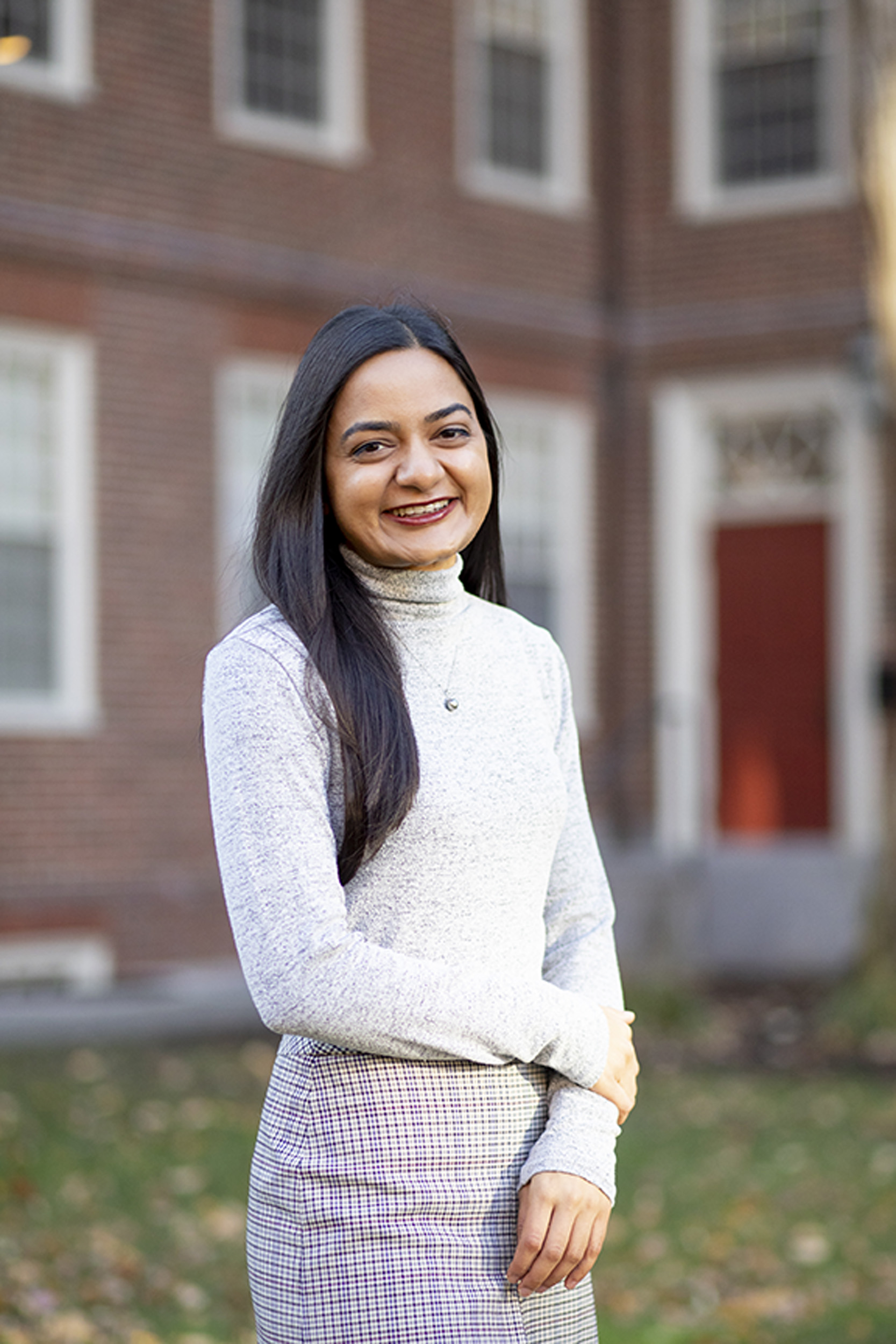
Rose Lincoln/Harvard Staff Photographer
Maya Burhanpurkar
Hometown: Oro-Medonte, Ontario, Canada
Concentration: Physics
Maya Burhanpurkar found out she had received a Rhodes Scholarship just as she arrived back to Quincy House following a whirlwind two-day trip to Toronto for in-person interviews. After receiving the congratulatory call from the prize committee, which included Nobel Prize winner in physics Donna Strickland and Canadian Supreme Court Justice Mahmud Jamal she called her parents and started texting and emailing friends and mentors with the good news.
“I really just felt this overwhelming sense of gratitude to all of those family members, friends, professors, and mentors who supported me along the journey,” said Burhanpurkar. “Without every single one of those people, this probably wouldn’t have happened.”
Burhanpurkar plans to pursue two master’s degrees at Oxford: Advanced Computer Science and Philosophy of Physics. The areas of study reflect her interests in those fields, as well as her recent research on algorithmic fairness.
Reflecting on her Harvard experience, Burhanpurkar emphasized the value of community in academic and social life on campus.
All three of the physics concentrators who received scholarships “have been mentored by female faculty in the department, and I think we have—I know I have—spent a lot of time trying to help make the department more welcoming to underrepresented students,” she said. “It’s really meaningful for me to see this happening.”
“The thing that I really cherish about Harvard is definitely the community,” added Burhanpurkar. “That’s part of why I was so involved in the physics department and trying to help foster more of that there.”
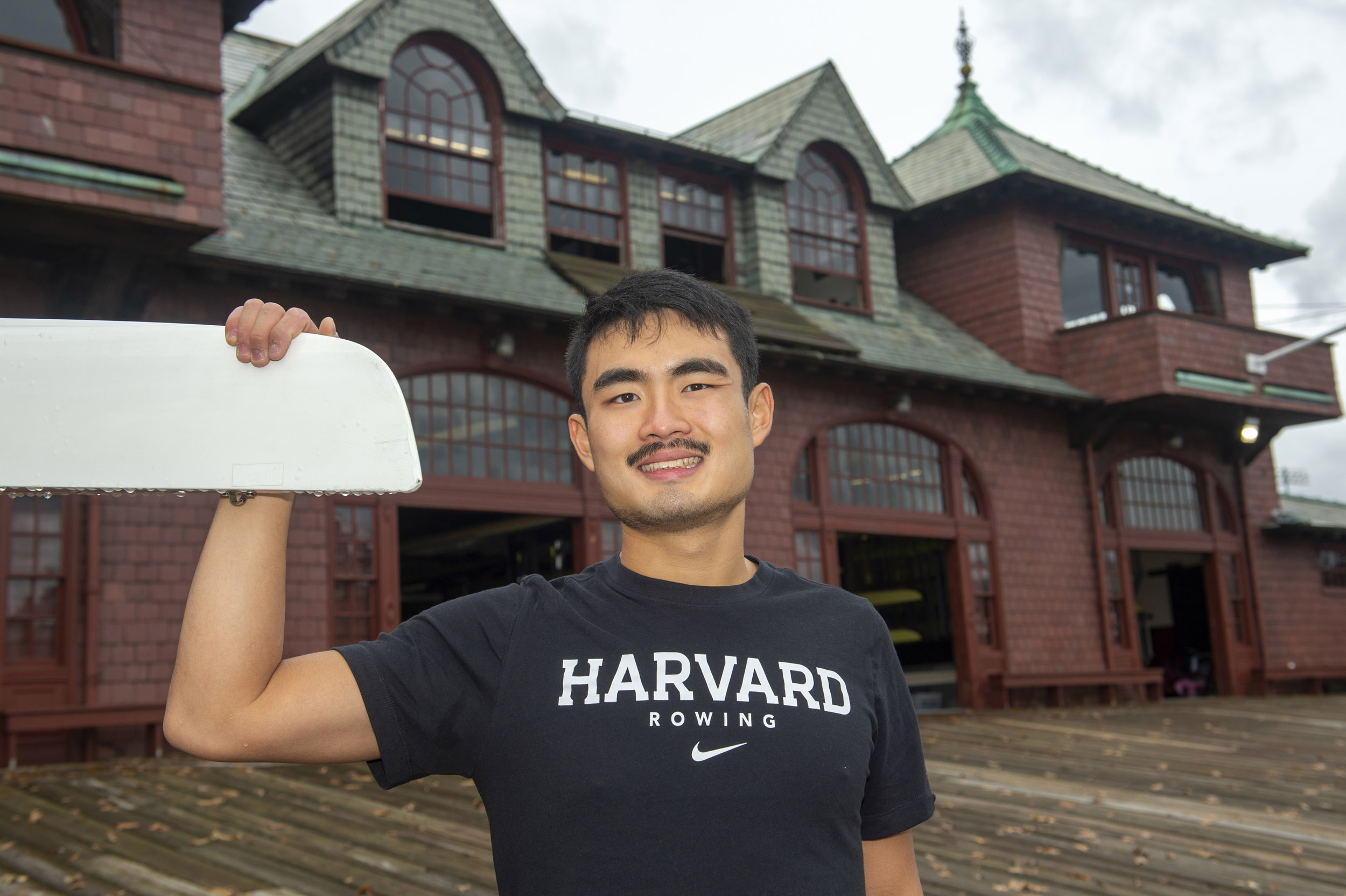
Jon Chase/Harvard Staff Photographer
Michael Y. Cheng
Hometown: Philadelphia and Wynnewood, Pa.
Concentrations: History and Mathematics, concurrent master’s degree in Computer Science
The rich rowing tradition at the University of Oxford was one of the reasons Michael Y. Cheng wanted to attend the university and apply for a Rhodes Scholarship. A recent convert to the sport, Cheng taught himself to swim last year in order to try out for the men’s varsity lightweight crew team, and earning a spot on the team was “the thing I am most proud of,” he said.
Cheng expressed gratitude to coaches Ian Accomando and Jesse Foglia in particular for the one-on-one coaching they provided during the pandemic.
“When I got to Harvard, I didn’t really have a community, and joining the team junior year gave me that. I am especially grateful to my coaches,” he said. “I was a complete novice and was quite unathletic growing up, so getting that kind of attention is something I’ll always be grateful for. Rowing helped me develop an imagination, a sense that things in my life, or in the world, don’t have to stay the way they are.”
That sense of possibilities also fueled the history and mathematics concentrator’s academic plans to pursue a doctorate in engineering science at Oxford. He’s also very much looking forward to having a chance to focus on just one field as a graduate student.
“I’m looking forward to having the chance to develop expertise, do cutting-edge research, and then figure out what I want to do,” said Cheng.
He also wants to develop his leadership skills to emulate his coaches and mentors at Harvard who helped him succeed on the rowing team and navigate the Rhodes application process.
“I won this scholarship, but it took a team to get me here,” he said.
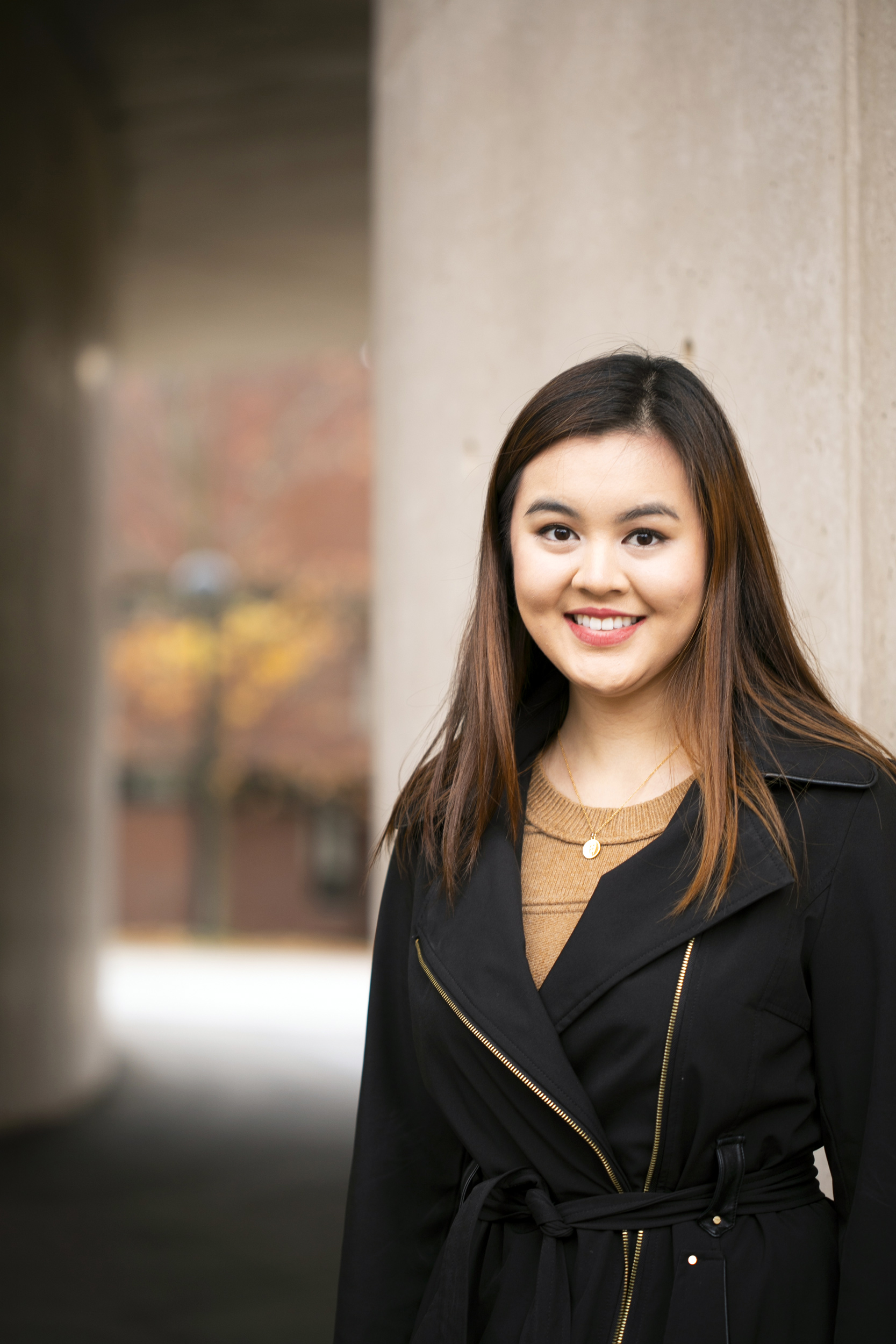
Stephanie Mitchell/Harvard Staff Photographer
Elizabeth Guo
Hometown: Plano, Texas
Concentration: Physics
Elizabeth Guo is always looking for ways to bridge her interests in law, policy, and science. At Harvard, she studies nanoscale quantum materials as a researcher in the Hoffman Lab and uses statistics and other quantitative measures to design ways to make the U.S. justice system fairer and more efficient as a researcher at the Access to Justice Lab at Harvard Law School.
These experiences, as well as an internship with Quantum Undergraduate Research at IBM and Princeton, helped shape her interdisciplinary approach to current issues in technology policy and law.
She plans to continue this intersectional work at Oxford in both mathematical and theoretical physics and social science of the internet as a master’s student. In 2024, Guo will matriculate at Harvard Law School.
“I think it’s really important for people with science backgrounds in general to have a seat at the table in policy discussions, and I’m excited to blend together my passions and figure out how to make a difference in these spaces,” she said.
Guo was an active member of the physics department during her time at Harvard, both academically and as the chair of Undergraduate Women in Physics. She was excited to see that two other women concentrating in physics also were Rhodes recipients this year.
“I’m very passionate about gender inclusivity in science, and I’ve worked towards building a more inclusive, diverse, welcoming, and joyful atmosphere within the department, so this is very exciting,” said Guo.
“Being a physics student has really taught me to be open minded and creative, and I’ve developed a passion for diving into problem solving because of that,” added Guo, who is a member of the Harvard College Honor Council and a news editor at the Harvard Crimson. “I feel so lucky to have this opportunity to figure out how I can best make a difference.”
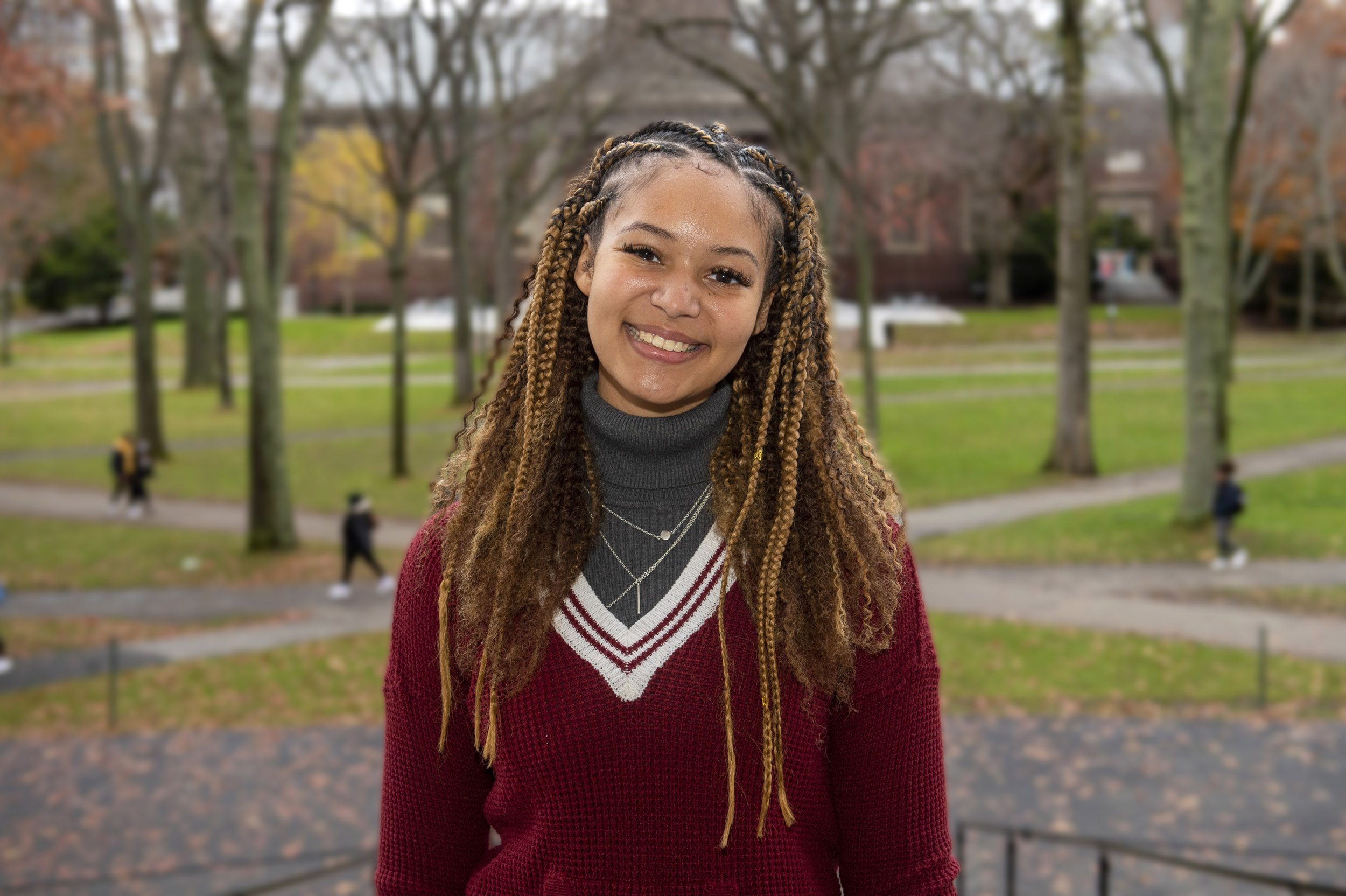
Jon Chase/Harvard Staff Photographer
Samantha C.W. O’Sullivan
Hometown: Washington, D.C.
Concentration: Physics and African American Studies
Samantha C.W. O’Sullivan is fascinated by the intersection of language and science. The dual concentrator in physics and African American Studies has spent the last three years studying Gullah — a Creole language spoken by African Americans living in the coastal areas and islands of North Carolina, South Carolina, Georgia, and Florida — and looking at how science and the physical universe are discussed in different languages.
At Oxford, O’Sullivan hopes to pursue a master of studies in philosophy of physics and a master of science in applied linguistics. She’s not only eager to explore the rich culture and history at Oxford, but is excited to connect with professors there, she said.
“I feel so honored. I know the scholarship has a very long, storied history of so many amazing, impressive scholars,” O’Sullivan said. “So, to just join the ranks of them feels so humbling.”
Apart from her studies, O’Sullivan started and led the Generational African American Students Association at Harvard, an experience she called “transformative.” The organization aims to foster community among students who identify as Generational African Americans (a term coined by O’Sullivan’s grandfather to identify Black people who trace their lineage in the United States back hundreds of years), the larger Black community, and Harvard, as well as raise awareness and spark change on issues surrounding the legacy of slavery.
“I’m really hoping that the activism we set in place here continues after I graduate. I recognize that founding this organization was a big part of me becoming a Rhodes Scholar,” O’Sullivan said. “I feel so passionately about it and hope that it continues to do a lot of work on Harvard campus.”
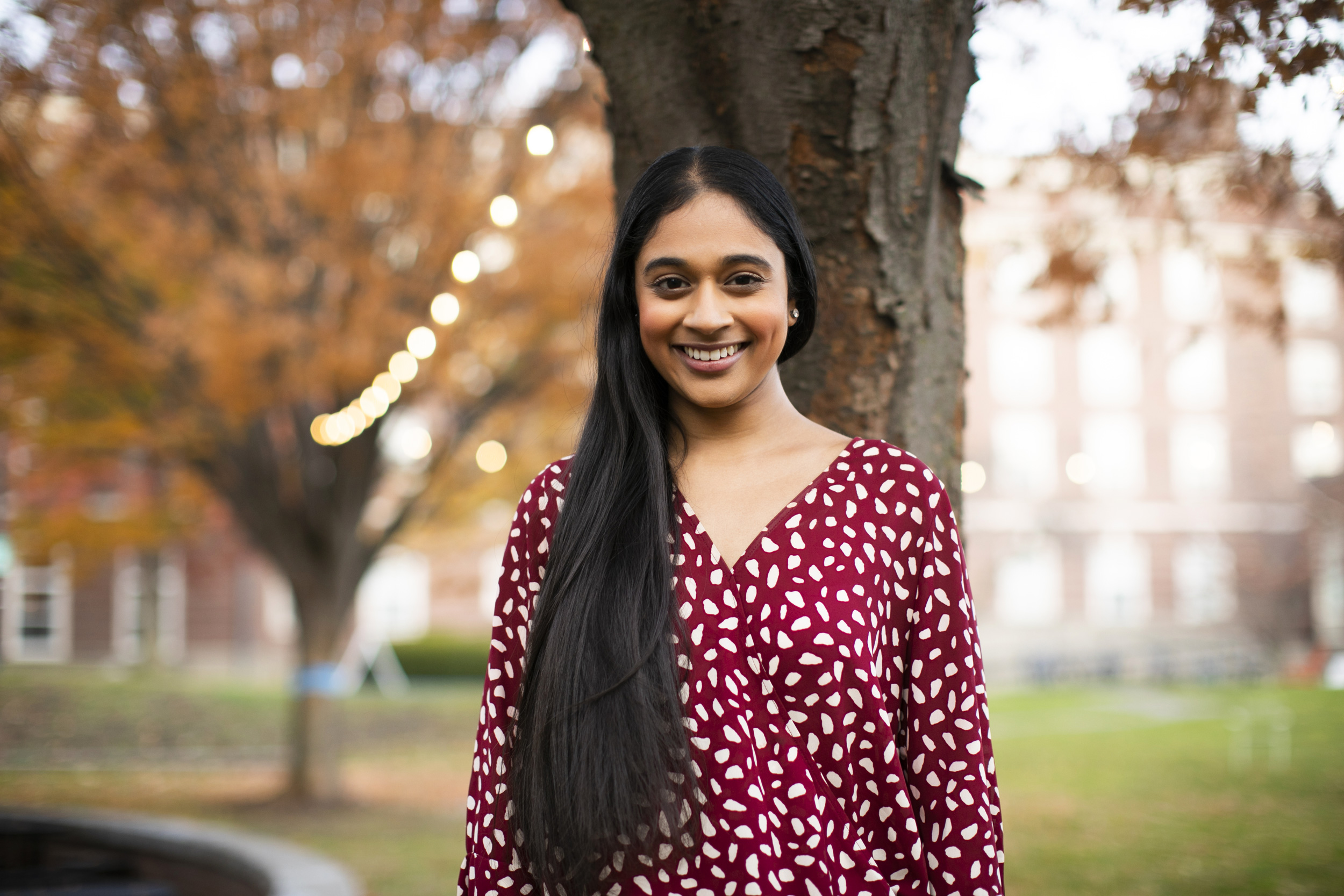
Stephanie Mitchell/Harvard Staff Photographer
Trisha Prabhu
Hometown: Naperville, Ill.
Concentration: Government, Technology Science Track
Trisha Prabhu is dedicated to making the internet a safer place. At Harvard, Prabhu is concentrating in government on the tech science track, which looks at the unexpected consequences of technology and aims to create new solutions to conflicts between technology and society.
“My goal will be to continue the work that I’ve had the chance to do here at Harvard, where I look at the unforeseen consequences of technology and the internet on our society,” Prabhu said. “I think about how we can solve the internet’s harms and try to create a digital world that is more kind, inclusive, and fair.”
Prabhu is the founder and CEO of ReThink Inc., an app that detects offensive digital content and allows users the opportunity to reconsider posting it online. She also holds several patents and was recently a Civic Digital Fellow at the U.S. Department of Health and Human Services, where she helped lead the KidneyX Accelerator to incentivize businesses and innovators to work on kidney care technology solutions.
At Oxford, Prabhu hopes to study the social science of the internet and public policy.
Being named a Rhodes Scholar “is such a surreal, yet very special experience. More than anything, I just feel such immense gratitude for the people that have gotten me here, members of the Harvard community like my professors, who encouraged me to go after an opportunity like this and equipped me with the skills and confidence,” Prabhu said. She noted that she’s excited to join the “exceptional community” at Oxford, with “smart changemakers who care deeply about the problems that they want to try to affect change on.”
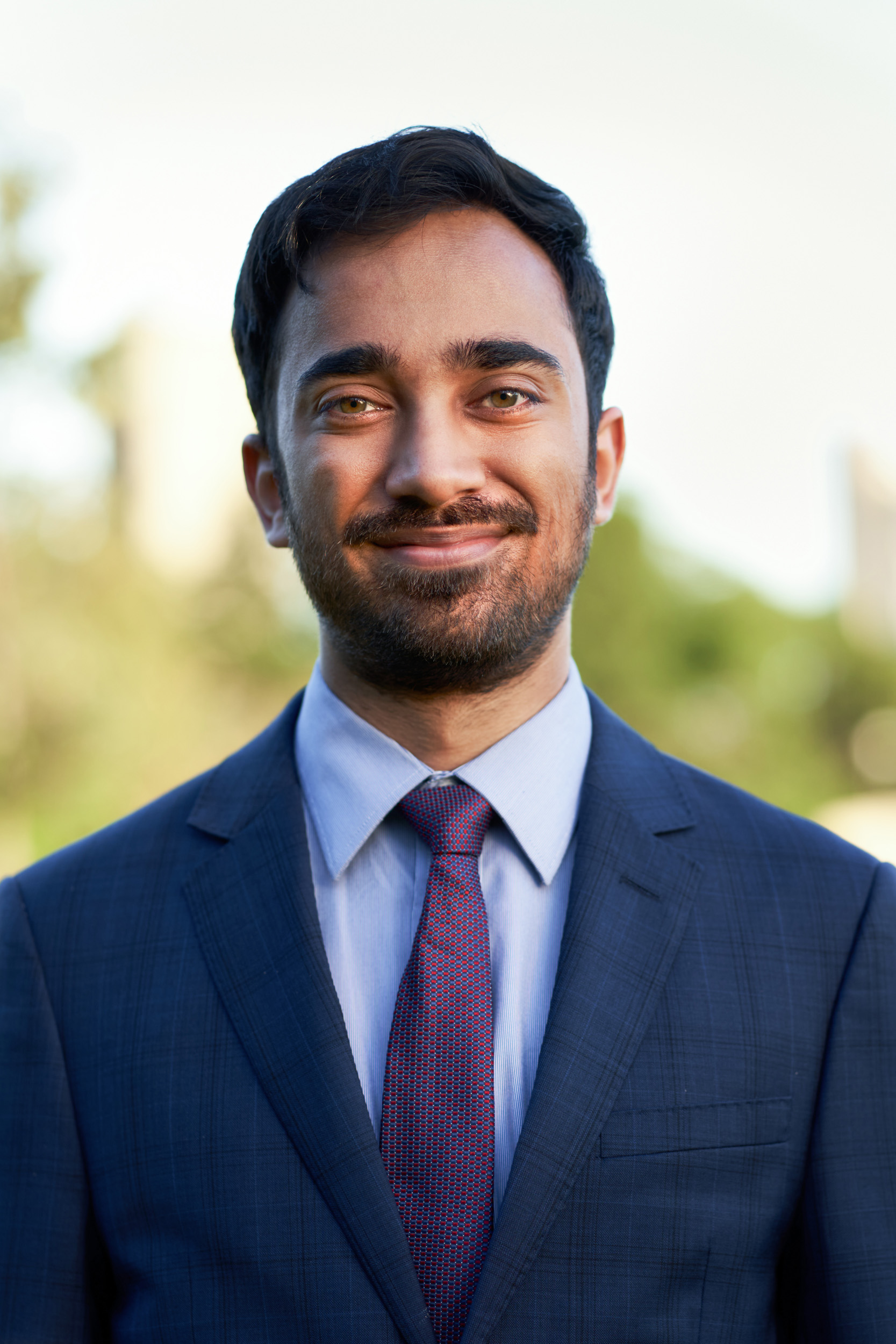
Photo by Daniel Huang
Ramiz Razzak
Hometown: Brossard, Quebec, Canada
Concentration: Applied Mathematics and Economics, Secondary in Philosophy
An applied mathematics and economics concentrator, Ramiz Razzak studies monetary and fiscal tools that can be used to manage economic crises, which typically disproportionately affect the most vulnerable. As part of his senior thesis, Razzak is investigating whether central banks should use interest rate policy to counteract the buildup of financial imbalances. His research is also looking at whether North American monetary policy has historically been responsive to changes in sentiment in credit markets.
At Oxford, Razzak hopes to continue this work, with a particular focus on how current economic tools affect financial stability and inequality. He intends to study economic and social history.
“I really am passionate about that research, because I feel that people who are most vulnerable during those types of events are the ones that get hit first,” he said. “If we can get even a little bit more clarity in terms of how to go about doing a better job using monetary and fiscal tools, I think that we can have a big impact.”
While he’s unsure where his studies will take him, Razzak is sure about one thing: He eventually wants to return home to Canada to serve his community.
“I don’t know what form it’ll take,” Razzak said. “If it’s through monetary policy at the Bank of Canada or fiscal policy with the Department of Finance Canada, or even involvement in Quebec, I just know that’s something that I hold dearly. I want to give back to a community in a country that has given so much to me.”
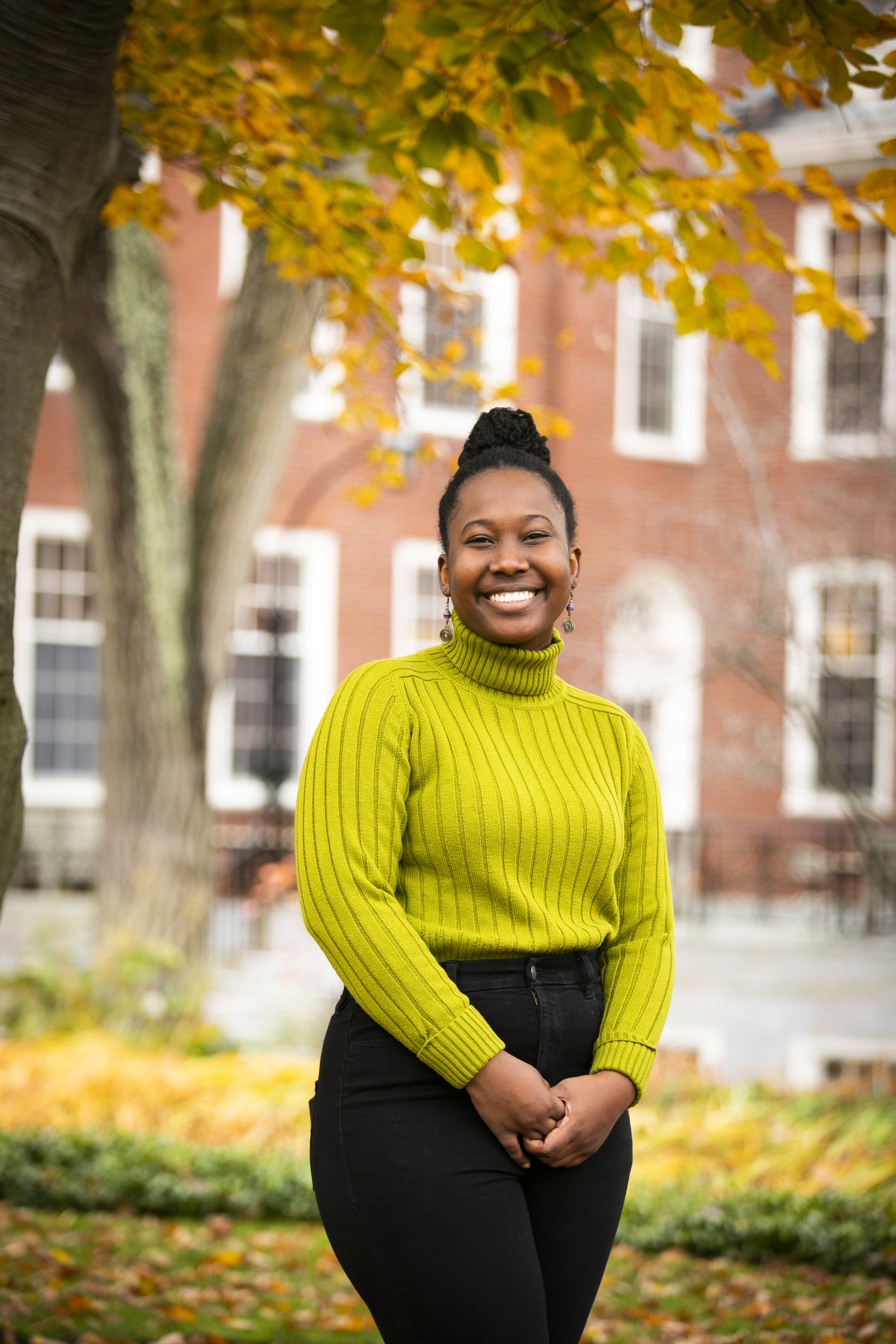
Stephanie Mitchell/Harvard Staff Photographer
Tonia N. Williams
Hometown: Spanishtown, Jamaica
School: Harvard Graduate School of Education
Tonia N. Williams sees her next chapter at Oxford as a chance to continue to pursue her academic passion for education — a journey she began at Harvard last year. Williams, who is a master’s student at the Harvard Graduate School of Education, will seek a doctorate in experimental psychology with a focus on developmental psychology.
Williams entered Vassar College with a desire to learn more about the intersections of computer science and education, and focused on psychology. By the end of college, she had a strong foundation in neuroscience and other physiological elements of psychology but wanted to expand her understanding of early childhood development.
That led to her HGSE degree and a position as a research assistant in the Spelke Lab at the Harvard Laboratory for Developmental Studies. At Oxford, she wants to continue learning about psychological research in early childhood development that can be used to improve education.
“This whole process taught me to trust my instincts,” said Williams. “I almost applied for the Rhodes last year and didn’t because I thought my application could be stronger this year. I followed my interests from computer science and education to physiological psychology and back to human development. My interests have pulled me in different directions, I’ve trusted the process, and it’s all worked out.”




